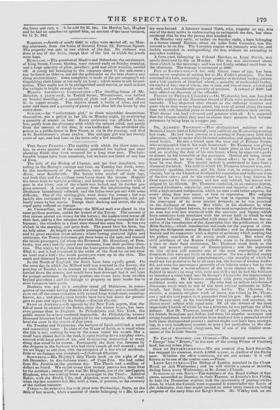DE. ANDREW Tnoarsosa—This distinguished minister of the Scottish Church died
at Ediriburgh, very suddenly,on Wednesday evening last Week. He had been present at a meeting of Presbytery held that afternoon, where he spoke with his usual animation, and apparently in his usual health. He met a friend near the west end of Princes Street, who accompanied him in his walk homeward. Dr. Thomson was giving this gentleman an account of what bad taken place at the Presbytery; and on reaching the door of his own house, where he expected a party to dinner, he fell insensible on the pavement. Medical aid being imme- diately procured, he was bled, but without effect ; in less than an hour he was dead. The mortal malady is understood to have been a disease of the heart. The field in which Dr. Thomson laboured was, corn paratively speaking, narrow, and his fame was, in consequence, pro- vincial; hut in the Church of Scotland his reputation and influence were of the first order ; and in the society where he was long known, he lived respected by his enemies, and not only beloved, but almost wor- shipped by his friends. Dr. Thomson combined, in an eminent degree, personal kindliness, simplicity, and warmth and sincerity of affection, with a high-minded indignation, which no man could better express, for every thing that was mean or base or oppressive. His religion was of the Calvinistic school; and he was as rigorous in exacting the observance of its most minute demands, as he was punctual in the discharge of them. But while, in his obedience to what he deemed the highest behests, he was the most scrupulous of the devout, no man was ever less tinctured with the sourness and bigotry which have sometimes been associated with the severe faith in which he was an honest believer. He quarrelled with many of his friends on the oc- casion of the introduction of the Apocrypha into the publications of the Bible Society,—which introduction was made for the purpose of circu- lating the Scriptures among Roman Catholics ; and he denounced the Society and its supporters with a degree of acrimony which nothing but his perfect conviction of its errors could excuse. But when the civil privileges of the Roman Catholics came to be discussed with a view to their final settlement, Dr. Thomson stood forth as the bold and earnest advocate of Emancipation ; and his argument on that subject still remains one of the most convincing of the thousands that were put forth on the occasion. He was a decided enemy to theatres and theatrical entertainments,—the morality of which he could not but perceive to be in all cases lax, the lessons of wisdom doubt- ful, and even the amusement generally of an inferior order ; but he was at the same time a warm admirer of the more elegant arts. He de- lighted in music ; he sung with taste and skill ; and he had the boldness to introduce a vocal band into St. George's Church for the improvement of the psalmody. Dr. Thomson composed with great rapidity, but his published works are not many. He who had to deliver two finished discourses every week to one of the most critical audiences in Edin- burgh, had little leisure for writing books. The Christian In- structor, a monthly religious work of merit, was edited by Dr. Thom- son ; and the best papers in it proceeded from his pen. He spoke with great fluency, and, as his knowledge was extensive and accurate, on almost every subject with equal ease. Of all the divines of the most respectable Church of which be was a minister, he was perhaps the ablest debater. Had Dr. Thomson, instead of the pulpit, chosen the bar, as Isis friends Brougham and Jeffrey had done, his singular acuteness and strong-headedness would doubtless have rendered him a powerful rival of both these distinguished persons ; and we might now have been attempt- ing, in a very insufficient manner, to note a few particulars in the cha- sacter, not of a provincial clergyman, but of one of the chiefest °man ments of the British Senate.


























 Previous page
Previous page